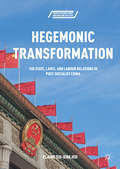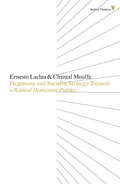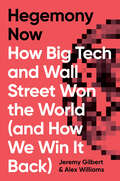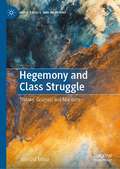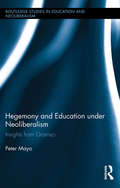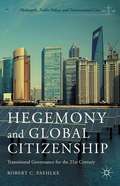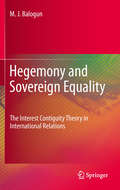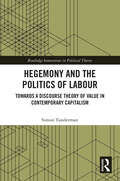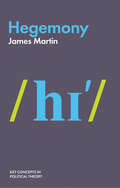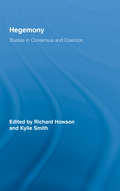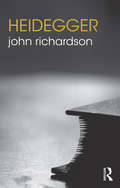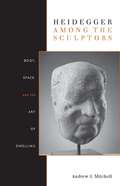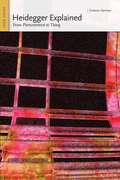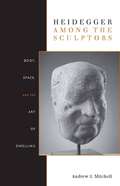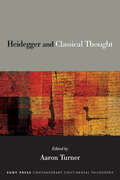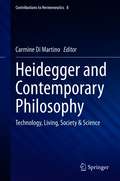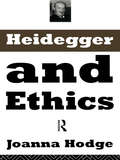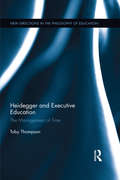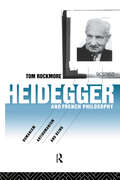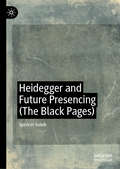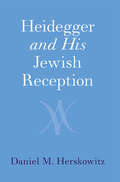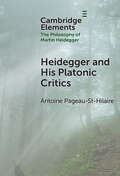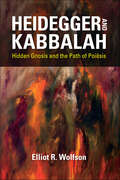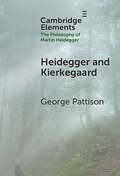- Table View
- List View
Hegemonic Transformation: The State, Laws, and Labour Relations in Post-Socialist China (Series in Asian Labor and Welfare Policies)
by Elaine Sio-ieng HuiThis book contends that the Chinese economic reform inaugurated since 1978 has been a top-down passive revolution, in Gramsci’s term, and that after three decades of reform the role of the Chinese state has been changing from steering the passive revolution through coercive tactics to establishing capitalist hegemony. It illustrates that the labour law system is a crucial vehicle through which the Chinese party-state seeks to secure the working class’s consent to the capitalist class’s ethno-political leadership. The labour law system has exercised a double hegemonic effect with regards to the capital-labour relations and state-labour relations through four major mechanisms. However, these effects have influenced the Chinese migrant workers in an uneven manner. The affirmative workers have granted active consent to the ruling class leadership; the indifferent, ambiguous and critical workers have only rendered passive consent while the radical workers has refused to give any consent at all.
Hegemony And Socialist Strategy
by Chantal Mouffe Ernesto LaclauIn this hugely influential book, Laclau and Mouffe examine the workings of hegemony and contemporary social struggles, and their significance for democratic theory. With the emergence of new social and political identities, and the frequent attacks on Left theory for its essentialist underpinnings, Hegemony and Socialist Strategy remains as relevant as ever, positing a much-needed antidote against 'Third Way' attempts to overcome the antagonism between Left and Right.
Hegemony Now: How Big Tech and Wall Street Won the World (And How We Win it Back)
by Alex Williams Jeremy GilbertHow did we come to live in a world dominated by big tech and finance? Today power is in the hands of Wall Street and Silicon Valley. How do we understand this transformation in power? And what can we do about it? We cannot change anything until we have a better understanding of how power works, who holds it, and why that matters. Through upgrading the concept of hegemony—understanding the importance of passive consent; the complexity of political interests; and the structural force of technology—Jeremy Gilbert and Alex Williams offer us an updated theory of power for the twenty-first century. Hegemony Now explores how these forces came to control our world. The authors show how they have shaped the direction of politics and government as well as the neoliberal economy to benefit their own interests. However, this dominance is under threat. Following the 2008 financial crisis, a new order emerged in which the digital platform is the central new technology of both production and power. This offers new opportunities for counter hegemonic strategies to win back power. Hegemony Now outlines a dynamic socialist strategy for the twenty-first century.
Hegemony and Class Struggle: Trotsky, Gramsci and Marxism (Marx, Engels, and Marxisms)
by Juan Dal MasoLeon Trotsky and Antonio Gramsci are two of the most important Marxist thinkers of the 20th century. This book explores the similarities and the differences between their philosophical and political theories. The first and second chapters deal with a still under-investigated aspect of Trotsky’s thought, i.e. his reflections on the issue of hegemony. The third chapter focuses on Gramsci’s critique of Trotsky in his Prison Notebooks, analysing Gramsci’s knowledge of Trotsky’s positions as well as the scope and limits of Gramsci’s critique. The fourth chapter consists of a critical rereading of Perry Anderson's essay Antinomies of Antonio Gramsci, originally published in 1976 and republished in 2017 and an analysis of the book Gramsci and Trotsky in the Shadow of Stalinism by Emanuele Saccarelli. The result is an investigation that offers new insight into both Trotsky’s and Gramsci’s thought, while proposing a new point of view from which to interpret revolutionary theory and strategy in the contemporary scenario. One of the main topics addressed throughout the three essays is the specific position of the problem of hegemony in a theory of permanent revolution, demonstrating that Trotsky had a particular understanding of the question of hegemony and that Gramsci, in turn, introduced a concept of hegemony that is closely associated with an idea of permanent revolution, such that the dynamics of the relationship between democratic struggles and socialist struggles presented in both theories are very similar.
Hegemony and Education Under Neoliberalism: Insights from Gramsci (Routledge Studies in Education, Neoliberalism, and Marxism #8)
by Peter MayoBased in a holistic exposition and appraisal of Gramsci’s writings that are of relevance to education in neoliberal times, this book--rather than simply applying Gramsci's theories to issues in education--argues that education constitutes the leitmotif of his entire oeuvre and lies at the heart of his conceptualization of the ancient Greek term hegemony that was used by other political theorists before him. Starting from this understanding, the book goes on to compare Gramsci's theories with those of later thinkers in the development of a critical pedagogy that can confront neoliberalism in all its forms.
Hegemony and Global Citizenship
by Robert C. PaehlkeAmericans felt part of 'the greatest nation on earth' and many of the world's citizens, with obvious exceptions, were warily comfortable with America's hegemonic power. That comfort faded dramatically during the Bush administration's rejection of Kyoto and its invasion of Iraq. Many, including many Americans, began to rethink global governance. A more democratic approach to international relations is necessary, especially one that addresses rising inequality worldwide and global financial instability driven by deregulation initiated by national governments. Citizens also demand a collective capacity to protect the natural systems on which we depend and more Americans now ask about the opportunity costs of military spending. Humankind shares a common fate. Accordingly, we need a democratic global capacity to act on common concerns. Rethinking our understanding of citizenship as global rights and obligations as well as national ones is in order, as is active global citizenship as an alternative to hegemony's limits and perils.
Hegemony and Sovereign Equality
by M. J. BalogunThe "interest contiguity theory," which is the book's centerpiece, holds that rather than a smooth, one-way cruise through history, humankind's journey from the inception to the present has brought him/her face to face with broadly three types of interests. The first is the individual interest, which, strange as it may sound, tends to be internally contradictory. The second is society's (or "national") interest which, due to the clash of wills, is even more difficult than personal interest to harmonize. The third is the interest espoused to justify the establishment and maintenance of supranational institutions. Though conflicting, some interests are, due to their relative closeness (or contiguity), more easily reconcilable than others. In tracing the links between and among the three broad types of interests, the book begins with a brief philosophical discussion and then proceeds to examine the implications of human knowledge for individual liberty. Against the backdrop of the epistemological and ontological questions raised in the first chapter, the book examines the contending perspectives on the theory of the state, and in particular, the circumstances under which it is justified to place the interest of society over that of the individual. The focus of the fourth chapter is on the insertion of the supranational governance constant in the sovereignty equation, and on the conflict between idealist and realist, and between both and the Kantian explanations for the new order. The adequacy or otherwise of the conflicting explanations of the change from anarchy to a 'new world order' is the subject taken up in the succeeding chapters. Besides suggesting a new analytical tool for the study of politics and international relations, the contiguity theory offers statespersons new lenses with which to capture the seismic, perplexing and sometimes disconcerting changes unfolding before their eyes.
Hegemony and the Politics of Labour: Towards a Discourse Theory of Value in Contemporary Capitalism (Routledge Innovations in Political Theory)
by Simon TundermanHegemony and the Politics of Labour takes up a question that goes to the heart of the debate about politics, capitalism, and discourse: how can labour relations and value production be understood as discursive processes? When they launched their poststructuralist discourse theory almost 40 years ago, Ernesto Laclau and Chantal Mouffe positioned the contingency of discourse and politics in sharp contrast to the deterministic tendencies of the Marxist critique of capitalism. Moving beyond Marxism as an essentialist ‘other’, discourse theory has since remained notoriously silent on questions related to the core workings of capitalism. This book is the first to bring the central categories of discourse theory into conversation with Marx’s critique of political economy. Reintegrating both traditions, it argues that the social relations of labour in capitalism emerge as a hegemonic formation. Its contribution is to extend the reach of discourse theory to the capitalist economy, exploring how a post- Marxist account of labour, value, and class connects to the contingent politics of populism. Hegemony and the Politics of Labour is an original and important contribution to the fields of discourse theory and critique of political economy.
Hegemony: Hegemony, Radical Democracy, And The Political (Key Concepts in Political Theory)
by James MartinPower rarely works by force alone: it also rules by winning hearts and minds. States, classes, and social groups all seek political dominance by exerting political, ideological, or cultural leadership over others. This idea – hegemony – is a subtle, complex one, which is too often applied crudely. In this succinct introduction, political theorist James Martin skilfully examines these nuances and shines a new light on hegemony. He introduces its component ideas and critically surveys the most influential thinking about hegemony, from Gramsci’s theory of hegemony as a revolutionary strategy and Marxist theories of the state, politics, and culture to the Post-Marxist project of radical democracy. He then considers the concept’s critical role in analysing international politics and global political economy, and evaluates the criticism that hegemony is too state-centric to truly capture the dynamics of contemporary struggles for emancipation. This lucid and accessible guide to hegemony will be essential reading for all students of radical politics and social and political theory.
Hegemony: Studies in Consensus and Coercion (Routledge Studies in Social and Political Thought #Vol. 56)
by Kylie Smith Richard HowsonThe originality and depth of Gramsci's theory of hegemony is now evidenced in the wide-ranging intellectual applications within a growing corpus of research and writings that include social, political and cultural theory, historical interpretation, gender and globalization. The reason that hegemony has been so widely and diversely adopted lies in the unique way that Gramsci formulated the 'problematics' of structure/superstructure, coercion/consensus, materialism/idealism and regression/progression within the concept hegemony. However, in much of the contemporary literature the full complexity of hegemony is either obfuscated or ignored. Hegemony, through comprehensive and systematic analyses of Gramsci's formulation, a picture of hegemony as a complex syncretism of these dichotomies. In other words, hegemony is presented as a concept that is as much about aspiration and progressive politico-social relations as it is about regressive and dominative processes. Thus, the volume recognises and presents this complexity through a selection of contemporary theoretical as well as historico-social investigations that mark a significantly innovative moment in the work on hegemony.
Heidegger (The Routledge Philosophers)
by John RichardsonMartin Heidegger is one of the twentieth century’s most influential, but also most cryptic and controversial philosophers. His early fusion of phenomenology with existentialism inspired Sartre and many others, and his later critique of modern rationality inspired Derrida and still others. This introduction covers the whole of Heidegger’s thought and is ideal for anyone coming to his work for the first time. John Richardson centres his account on Heidegger’s persistent effort to change the very kind of understanding or truth we seek. Beginning with an overview of Heidegger’s life and work, he sketches the development of Heidegger’s thought up to the publication of Being and Time. He shows how that book takes up Husserl’s method of phenomenology and adapts it. He then introduces and assesses the key arguments of Being and Time under three headings—pragmatism, existentialism, and temporality—its three levels of analysis of human experience. Subsequent chapters introduce Heidegger’s later philosophy, including his turn towards a historical account of being, and new ideas about how we need to ‘think’ to get the truth about it; his influential writings on language, art, and poetry, and their role in the Western history of being; and his claim that this history has culminated in a technological relation to things that is deeply problematic, above all in the way it excludes the divine. The final chapter looks at Heidegger’s profound influence on several intellectual movements ranging from phenomenology to existentialism to postmodernism. A much-needed and refreshing introduction to this major figure, Heidegger is ideal reading for anyone coming to his work for the first time and will interest and stimulate students and scholars alike.
Heidegger Among the Sculptors
by Andrew MitchellIn the 1950s and 60s, Martin Heidegger turned to sculpture to rethink the relationship between bodies and space and the role of art in our lives. In his texts on the subject-a catalog contribution for an Ernst Barlach exhibition, a speech at a gallery opening for Bernhard Heiliger, a lecture on bas-relief depictions of Athena, and a collaboration with Eduardo Chillida--he formulates his later aesthetic theory, a thinking of relationality. Against a traditional view of space as an empty container for discrete bodies, these writings understand the body as already beyond itself in a world of relations and conceive of space as a material medium of relational contact. Sculpture shows us how we belong to the world, a world in the midst of a technological process of uprooting and homelessness. Heidegger suggests how we can still find room to dwell therein. Filled with illustrations of works that Heidegger encountered or considered, Heidegger Among the Sculptors makes a singular contribution to the philosophy of sculpture.
Heidegger Explained
by Graham HarmanHeidegger Explained is a clear and thorough summary of the philosophy of Martin Heidegger (1889-1976). It gives a fascinating explanation of all stages of Heidegger's life and career, and shows his entire philosophy to emerge from one simple but profound insight.Many philosophers believe that Heidegger was the greatest philosopher of the twentieth century. His influence has long been felt not just in philosophy, but also in such fields as art, architecture, and literary studies. Yet the great difficulty of Heidegger's terminology has often scared away interested readers lacking an academic background in philosophy.Author Graham Harman shows that Heidegger is actually one of the simplest and clearest of thinkers. All the diverse topics of his writings, and all the lengthy analyses he gives of past philosophers, boil down to a single powerful idea: being is not presence. In any human relation with the world, our thinking and even our acting do not fully exhaust the world. Something more always withdraws from our grasp. Neither being itself nor individual beings are ever fully "present-at-hand," in Heidegger's terminology.This single insight allows Heidegger to revolutionize the phenomenology of his teacher Edmund Husserl. The method of Husserl was to focus entirely on how things present themselves to us as phenomena in consciousness. Heidegger understood that the things are always partly hidden from consciousness, living a secret life of their own. Human beings are not lucid scientific observers staring at the world and describing it, but instead are thrown into a world where light is always mixed with shadow.For Heidegger, the entire history of philosophy has reduced being to some sort of presence, whether by defining it as atoms, consciousness, perfect forms, the will to power, or even God. In this way, past philosophers have all chosen one specific kind of privileged being to represent being itself. Yet this is impossible, since being always partly withdraws from any attempt to define it. For this reason, philosophy needs to make a new beginning, one that would be just as great as the first beginning in ancient Greece.The book ends by shedding new light on Heidegger's concept of the fourfold, which is so notoriously difficult that most commentators avoid it altogether.
Heidegger among the Sculptors: Body, Space, and the Art of Dwelling
by Andrew J. MitchellMartin Heidegger turned to sculpture to rethink the relationship between bodies and space and the role of art in our lives. In his texts on the subject, a catalog contribution for an Ernst Barlach exhibition, a speech at a gallery opening for Bernhard Heiliger, a lecture on bas-relief depictions of Athena, and a collaboration with Eduardo Chillidahe formulates his later aesthetic theory, a thinking of relationality.
Heidegger and Classical Thought (SUNY series in Contemporary Continental Philosophy)
by Aaron TurnerDespite a sustained and fruitful relationship with the classical philologists of his day, Martin Heidegger's status among classicists has long since been strained, especially in the Anglophone tradition. Heidegger and Classical Thought reemphasizes both Heidegger's importance to classical discourse and the significance of classical discourse for Heidegger's own work. The essays found in this book demonstrate the depth and breadth of Heidegger's engagement with classical thought throughout his life, from his early engagements with Aristotle and Plato to his profound readings of the early Greek thinkers. At the same time, this book shows how reading Heidegger's interpretation of classical thought offers new and innovative ways to approach and study antiquity.
Heidegger and Contemporary Philosophy: Technology, Living, Society & Science (Contributions to Hermeneutics #8)
by Carmine Di MartinoThis text illuminates the relevance and importance of Heidegger’s thought today. The chapters address the modern living conditions of intense social transformation intertwined with the continuous and rapid development of technologies that redefine the borders between nations and cultures. Technology globalizes markets, customs, the exchange of information, and economic flows but also – as Heidegger reminds us – revolutionizes the way we relate to bodies, to life, and to earth, by way of introducing both unprecedented opportunities and great dangers.
Heidegger and Ethics
by Joanna HodgeHeidegger and ethics is a contentious conjunction of terms. Martin Heidegger himself rejected the notion of ethics, while his endorsement of Nazism is widely seen as unethical. This major new study examines the complex and controversial issues involved in bringing them together.By working backwards through his work, from his 1964 claim that philosophy has been completed to Being and Time, his first major work, Joanna Hodge questions Heidegger's denial that his enquires were concerned with ethics. She discovers a form of ethics in Heidegger's thinking which elucidates his important distinction between metaphysics and philosophy. Against many contemporary views, she proposes therefore that ethics can be retrieved and questions the relation between ethics and metaphysics that Heidegger had made so pervasive.
Heidegger and Executive Education: The Management of Time (New Directions in the Philosophy of Education)
by Toby ThompsonGlobal corporations and the senior executives who oversee them have been subject to great criticism in recent times: not only do such corporations hold extreme concentrations of wealth, but they continue to sanction staggering pay inequalities between the haves and the have-nots. At the same time, university-based business schools are conducting programmes of executive education seemingly customised to sanction these same inequalities. Heidegger and Executive Education is a piece of critical philosophy that has been written from within the business school in order to examine how this sheltered process of educating in-role corporate executives operates. Thompson claims that executive education is based on a very simple premise: that an executive executes an order, and that executive education is an amelioration of that process. Thompson argues that the easiest way to conceive of executive education is to treat order and execution as cognates, as a single conceptual entity. Thus, he asks, if educating executives in line with the order-execution cognate involves swapping the boardroom for the classroom, and in keeping with the ‘critical’ tag, shouldn’t executive education be about questioning not only the execution, but also the dominant order? The author uses ‘time’ as the philosophical method by which one can undo the order-execution cognate, question the sanctity of the cognate and thereby halt the seemingly inexorable temporal sequence from order through to those orders becoming executed. This book uses Martin Heidegger’s exotic philosophy of time in order to mount a philosophical challenge to the temporal sequentiality of executive education. It will therefore be of great interest to academics, researchers and postgraduates who are interested in Heidegger, the philosophy of education and executive education. It should also be essential reading for those involved in training, developing, and educating corporate executives.
Heidegger and French Philosophy: Humanism, Antihumanism and Being
by Tom RockmoreMartin Heidegger's impact on contemporary thought is important and controversial. However in France, the influence of this German philosopher is such that contemporary French thought cannot be properly understood without reference to Heidegger and his extraordinary influence. Tom Rockmore examines the reception of Heidegger's thought in France. He argues that in the period after the Second World War, due to the peculiar nature of the humanist French Philosophical tradition, Heidegger became the master thinker of French philosophy. Perhaps most importantly, he contends that this reception - first as philosophical anthropology and later as postmetaphysical humanism - is systematically mistaken.
Heidegger and Future Presencing (The Black Pages)
by Spencer GolubThis book applies Heidegger’s writings to experimental fictions and film genres in order to study a being-there that performs itself beyond liveness and a future that is already here. Theatrical mise-en-scène is analyzed as a way of modeling the Heideggerian ontological-existential, exchanging a deeper presencing for the fictional “now” of liveness. The book is organized around ostensible objects that are in fact things-as-such and performs its theme via time-traveling, interruptions, decompositions, incompleteness, failure, geometric patterning, and above all black pages first cited in Tristram Shandy. This is a nuanced, original work that combines unexpected sources with even more unexpected writing, imagery, and correspondences. It is part of Golub’s ongoing project of lyrically reimagining philosophy and the mise-en-scène of theatrical performance (a presence-room of consciousness) in light of one another.
Heidegger and His Jewish Reception
by Daniel M. HerskowitzIn this book, Daniel Herskowitz examines the rich, intense, and persistent Jewish engagement with one of the most important and controversial modern philosophers, Martin Heidegger. Contextualizing this encounter within wider intellectual, cultural, and political contexts, he outlines the main patterns and the diverse Jewish responses to Heidegger. Herskowitz shows that through a dialectic of attraction and repulsion, Jewish thinkers developed a version of Jewishness that sought to offer the way out of the overall crisis plaguing their world, which was embodied, as they saw it, in Heidegger's life and thought. Neither turning a blind eye to Heidegger's anti-Semitism nor using it as an excuse for ignoring his philosophy, they wrestled with his existential analytic and what they took to be its religious, ethical, and political failings. Ironically, Heidegger's thought proved itself to be fertile ground for re-conceptualizing what it means to be Jewish in the modern world.
Heidegger and His Platonic Critics (Elements in the Philosophy of Martin Heidegger)
by Antoine Pageau-St-HilaireThis Element introduces the arguments of three prominent Platonic critics of Heidegger – Leo Strauss (1899–1973), Hans-Georg Gadamer (1900–2002), and Jan Patočka (1907–1977) – with the aim of evaluating the trenchancy of their criticisms. The author shows that these three thinkers uncover novel ways of reading Plato non-metaphysically (where metaphysics is understood in the Heideggerian sense) and thus of undermining Heidegger's narrative concerning Platonism as metaphysics and metaphysics as Platonism. In their readings of the Platonic dialogues, Plato emerges as a proto-phenomenologist whose attention to the ethical-political facticity of human beings leads to the acknowledgment of human finitude and of the fundamental elusiveness of Being. These Platonic critics of Heidegger thus invite us to see in the dialogues a lucid presentation of philosophic questioning rather than the beginning of distorting doctrinal teachings.
Heidegger and Homecoming
by Robert MugerauerMartin Heidegger's philosophical works devoted themselves to challenging previously held ontological notions of what constitutes "being," and much of his work focused on how beings interact within particular spatial locations. Frequently, Heidegger used the motifs of homelessness and homecoming in order to express such spatial interactions, and despite early and continued recognition of the importance of homelessness and homecoming, this is the first sustained study of these motifs in his later works. Utilizing both literary and philosophical analysis, Heidegger and Homecoming reveals the deep figural unity of the German philosopher's writings, by exploring not only these homecoming and homelessness motifs, but also the six distinctive voices that structure the apparent disorder of his works. In this illuminating and comprehensive study, Robert Mugerauer argues that these motifs and Heidegger's many voices are required to overcome and replace conventional and linear methods of logic and representation. Making use of material that has been both neglected and yet to be translated into English, Heidegger and Homecoming explains the elaborate means with which Heidegger proposed that humans are able to open themselves to others, while at the same time preserve their self-identity.
Heidegger and Kabbalah: Hidden Gnosis and the Path of Poiesis (New Jewish Philosophy and Thought)
by Elliot R. WolfsonWhile many scholars have noted Martin Heidegger's indebtedness to Christian mystical sources, as well as his affinity with Taoism and Buddhism, Elliot R. Wolfson expands connections between Heidegger's thought and kabbalistic material. By arguing that the Jewish esoteric tradition impacted Heidegger, Wolfson presents an alternative way of understanding the history of Western philosophy. Wolfson's comparison between Heidegger and kabbalah sheds light on key concepts such as hermeneutics, temporality, language, and being and nothingness, while yielding surprising reflections on their common philosophical ground. Given Heidegger's involvement with National Socialism and his use of antisemitic language, these innovative readings are all the more remarkable for their juxtaposition of incongruent fields of discourse. Wolfson's entanglement with Heidegger and kabbalah not only enhances understandings of both but, more profoundly, serves as an ethical corrective to their respective ethnocentrism and essentialism. Wolfson masterfully illustrates the redemptive capacity of thought to illuminate common ground in seemingly disparate philosophical traditions.
Heidegger and Kierkegaard (Elements in the Philosophy of Martin Heidegger)
by George PattisonThe work examines the presence and significance of Kierkegaard in Heidegger's work. After setting out the context of Heidegger's reception of the Danish thinker and examining his likely knowledge of his writings, the work first examines key Kierkegaardian concepts that are explicitly present in Being and Time, including existence, 'idle talk' (Gerede), anxiety, the moment of vision, repetition, and the existential significance of death. It is seen that Heidegger regarded Kierkegaard as an essentially religious writer whose work was only indirectly relevant to Heidegger's own project of fundamental ontology. Subsequently, the work considers the place of Kierkegaard in Heidegger's writings from the 1930s onwards, concluding with consideration of the paper Heidegger submitted for the 1963 Paris UNESCO conference marking the 150th anniversary of Kierkegaard's thought.
